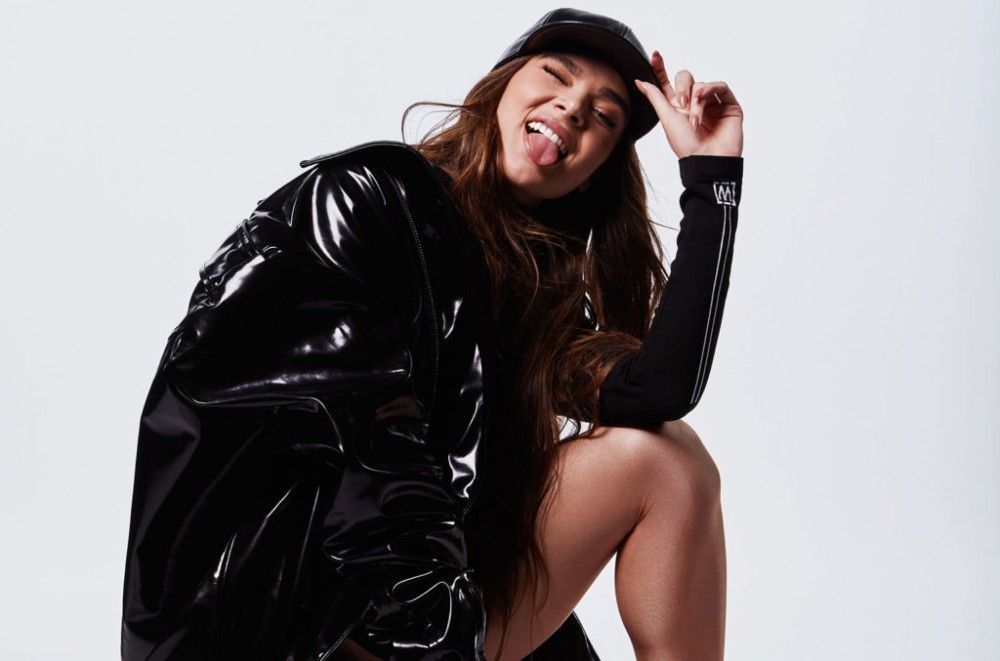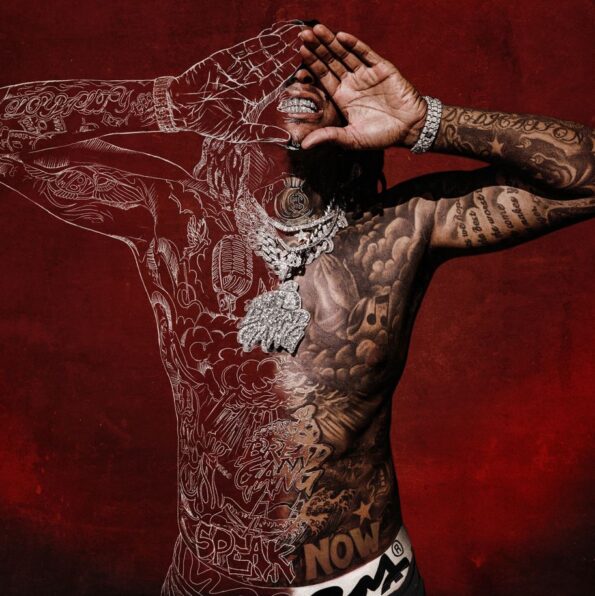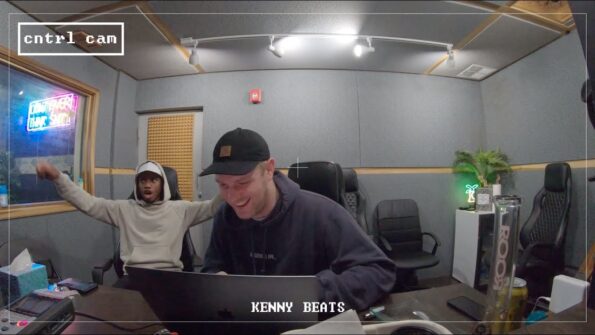On the eve of her first musical project in five years, the singer/actress is ready to find a different level of focus. "I used to think that I could do it all," she says, "And then I started losing sleep over it."
For the first time in a while, Hailee Steinfeld has some time on her hands.
“I’m just trying to keep busy, to stay sane, stay creative,” says the 23-year-old singer/actress, who’s been quarantining with her family in Los Angeles for the past several weeks. With her schedule freed up as the country remains on lockdown, Steinfeld has tried a few different ways to occupy herself: she ordered a bunch of recording equipment to create a makeshift home studio, for instance, which she had been meaning to do for a while. She tried to pick up painting, but only stuck with it for a few days. She’s learning to play the piano — or at least learning to master the fundamentals, “because that shit can get complicated very quickly,” Steinfeld asserts.
She’s also spent the weeks at home listening to music — full albums, specifically, absorbing recent LPs from The Weeknd and Tyler, The Creator, as well as family-favorite classics from the Eagles and Fleetwood Mac. During a video chat with Billboard, Steinfeld proudly shows off the gray Stevie Nicks t-shirt she’s wearing.
“I… take it for granted, the ability to sit and listen to an album from start to finish,” says Steinfeld, who speaks with a mix of poise and excitement. “I think that that’s what artists hope for when they put an album out, that you take the time to sit and listen like that. … It’s so special. I don’t know. The last time I think I listened to an album start-to-finish before quarantine] was, like, on an airplane. And I probably fell asleep.”
Nearly five years removed from her debut single — which brought her to instant top 40 prominence — Steinfeld still has yet to release an album of her own; she loves the idea of making one, of committing herself to an extended project. Part of the reason it hasn’t happened yet, though, is because her professional life has been unrelenting by design for the past half-decade.
The Los Angeles native has been staunchly dedicated to balancing a singing career and acting career since 2015, interspersing leading roles across genres with disarming pop singles aimed at mainstream radio. The coronavirus pandemic has forced countless artists to take an unforeseen break from their busy schedules, but for Steinfeld, the shutdown feels particularly startling.
Her breakthrough performance in 2010’s True Grit netted Steinfeld an Academy Award nomination at the age of 14; at 18, she scored a hit on her first try with her debut single, “Love Myself.” Since then, Steinfeld has toggled between mediums, with new opportunities each year and few breaks in between them. “There’s no denying it’s a challenge,” she says of managing her schedule, punctuating the last word with a dry laugh.
Being positioned as a dual threat is nothing new in modern Hollywood, especially for young women; for instance, Disney Channel and Nickelodeon stars often try their hand at both singing and acting as they enter adulthood, with varying levels of crossover success. But whereas contemporaries have toed the line for a while before eventually committing to a general focus — music over acting for Ariana Grande and Selena Gomez, vice versa for Zendaya and Victoria Justice — Steinfeld has made the polymath life work for her, starring in both popcorn flicks and critically acclaimed film and TV projects, while collecting chart hits and squeezing in occasional tour dates. The list of artists who were nominated for acting Oscars in the 2010s, and have also scored multiple top 40 Hot 100 hits, includes two names: Lady Gaga, and Steinfeld.
“Sometimes you have actors who score a hit and then disappear from the music world,” says Phil Guerini, vp of marketing at Radio Disney, which has consistently played Steinfeld’s singles. “There’s a difference between those who have a passion for music, and those who see it as another thing to accomplish to differentiate themselves. With Hailee, her music may have been preceded by her acting, but she has a work ethic and charisma like few others. You root for her.”
Steinfeld’s singles have been primarily composed of airy, anthemic synth-pop, and consistently garnered hundreds of millions of streams — her five biggest tracks to date have garnered a combined 1.79 billion on-demand streams in the U.S., according to Nielsen Music/MRC Data. Yet those singles have yet to coalesce into a solo project since her 2015 debut EP, Haiz. That introduction is at long last receiving a follow-up this Friday (May 8) with another EP, Half Written Story, that is being billed as the first half of a two-part project. The five new songs are the most experimental, and personal, of Steinfeld’s career; they include interpolations of songbook classics, a heartbroken ballad, and a foray into pop-rap. None of the songs sound like surefire radio staples, but that seems to be the point of Half Written Story.
“It’s not about just top 40 hits, but about adding depth and Hailee] expressing herself,” says manager Ed Millett. “We then are banking some ideas for her eventual debut album.”
For Steinfeld, the significance of Half Written Story has less to do with maintaining commercial momentum than trying on a few different sounds in order to establish one of her own. Her past five years’ worth of musical output consists of one-offs that were catchy enough to cross over and more thematically universal than personally revealing. Her two biggest hits following “Love Myself” were collaborations, and neither featured co-writing credits for Steinfeld.
Now, she is writing more, exploring more mature subject matter, and going through a self-described “trial-and-error process” in order to figure out what type of pop artist she wants to become. “I haven’t had that chance to really create what my] sound is, consistently,” Steinfeld says. “I still think I’m very much in that process of finding what it is. And I feel like, with every song I do, I get closer and closer.”
Wendy Goldstein, president of west coast creative at Republic Records, remembers signing Steinfeld to the label when she was already a movie star, having been featured not only in the acclaimed True Grit but in Pitch Perfect, Begin Again and Ender’s Game by 2015. “She was 18, or just about to turn 18, and she wanted to sing,” Goldstein recalls. “And she had a lot of fans from the acting side, so it was really nice that she was able to engage them.”
It helped that debut single “Love Myself,” co-written by the then-rising duo of Julia Michaels and Justin Tranter, was an unexpected barnburner, with winking lyrics about literal self-love and a crater-sized shout-along chorus. The song peaked at No. 30 on the Hot 100 and No. 15 on the Pop Songs tally; when the late 2015 release of the Haiz EP was followed by an even bigger hit, the 2016 Zedd-Grey collaboration “Starving” (No. 12 on the Hot 100), it appeared as if Steinfeld was about to become a mainstream force.
But then the acting world came calling again: Steinfeld spent the second half of 2016 promoting the coming-of-age dramedy The Edge of Seventeen, for which she earned a Golden Globe nomination for best actress in a motion picture musical or comedy, and the first half of 2017 filming the third installment of the Pitch Perfect franchise. The past few years have played out in similar fashion, with hit singles like “Let Me Go” — a stadium country-dance jam made with Florida Georgia Line, Alesso and Watt — and the empowerment anthem “Most Girls” squeezed in between starring roles in the Transformers spin-off Bumblebee and the Apple TV+ series Dickinson, on which Steinfeld plays a young Emily Dickinson.
Last fall, Steinfeld finalized a deal with the U.K.-based TaP management, and says that she now feels like her team is working more lock-step with her vision of balancing film and music. “Especially at first, I think both sides of the team were very interested to see how this was going to be seamlessly pulled off,” Steinfeld says when asked if she’s experienced any jostling between the different factions of her inner circle. Now, “Everybody knows how important both of these careers are to me, and that I’m not gonna do one and not the other.”
For as fruitful as her acting career has proven, it has resulted in setbacks her musical growth. Steinfeld has yet to embark on a proper headlining tour, for instance, instead allotting blocks of time to open for artists like Katy Perry, Charlie Puth and Meghan Trainor. Steinfeld also doesn’t have the volume of recording-studio reps that her years of experience would suggest, thanks to the months of filming she signs up for when taking on a new acting project. This has made committing to a full-length, as well as honing in on the stylistic direction of that project, a difficult task.
Goldstein says that Republic has tried to be as strategic as possible while working with Steinfeld’s schedule over the years, finding pockets of time for recording sessions and promotion. “She’s been great with blocking off weeks or months to focus on music,” says Goldstein. “And I try to be more prepared, to take care of us and avoid having a huge gap in the marketplace in between records — because in the streaming world, it’s about consistency.”
Yet Millett points out that, on a fundamental level, Steinfeld still needs to go through a deeper artistic process to unlock her full potential as a singer-songwriter. The road she’s taken, having spent the majority of her 23 years in the spotlight, is not an ordinary one. “Normally you start with an artist, going from a teenager to an adult, you’re working with] writers and producers and defining who you are. That journey is not something that she’s done,” he notes. “Self-expression, gaining confidence to say how you really feel — that’s a scary process when you’re already a famous person.”
When Steinfeld is making a movie or a television show, she says, she’s still writing songs, although not as consistently as when she’s off set. And that’s okay with her — Steinfeld is learning not to overload herself, even as she wants to take on new challenges.
“I used to think that I could do it all,” she says, “and that it was all great and fine and it was like, ‘I can definitely record that and do this and this and this.’ And then I started losing sleep over it. I’m like, I am too young to be this stressed out.”
Although Steinfeld has propped up a home studio during the pandemic and is teaching herself to play piano, Half Written Story is not the product of quarantine. The five songs resulted from a burst of creativity amidst what Steinfeld describes as a particularly low personal period, after Steinfeld finished filming the first season of Dickinson in New York in spring 2019 and headed home to Los Angeles.
“These songs represent a time in my life where I think, for the first time, I was really just knocked off my feet in a not-so-great way,” says Steinfeld. Half Written Story was preceded by “Wrong Direction,” a mournful ballad in which Steinfeld expresses regret over her time with a partner who “burned me down,” while “Your Name Hurts” expands upon that feeling of betrayal.
Steinfeld declines to specify further about its subject, but “Wrong Direction” has provoked fan speculation over which of her exes she’s writing about since its January release. “We hear this all the time: There are people who come into our lives to teach us something, and sometimes there is someone who comes in that just completely derails you from your path,” she says.
Yet Half Written Story balances its heartache with moments of resilience. “Man Up” finds Steinfeld operating in a half-rapped cadence and lobbing insults at an ex (“All of these tantrums, they won’t win me back, love / Just be a man, love”), while “I Love You’s,” which updates Annie Lennox’s version of “No More I Love You’s,” is built around a dismissal of empty sentiment (“Now there’s no fear, no more running / I don’t want words that mean nothing”).
Steinfeld worked on the project with Koz, the Canadian producer-songwriter best known for his work with Dua Lipa, and says that the “constant riffing on sounds and ideas” resulted in slower tempos, different vocal approaches and a more adventurous sonic palette. Neither of the songs released ahead of the EP have reached the Hot 100 chart, yet Steinfeld says that Half Written Story has given her a much-needed sense of release. And as her first project since 2015, it also updates her worldview.
“This is her first statement as a girl who is now an adult, who has lived life a little bit,” Goldstein notes. “She’s really hunkered down in the studio, and has something to say.”
The second part of Half Written Story will be released later this year, although beyond that, Steinfeld doesn’t really know what the second half of her 2020 looks like. Production on the second season of Dickinson wrapped just before the pandemic brought the U.S. to a standstill, and all of her other acting and promotional plans have been put on hold, so Steinfeld will presumably have even more time to focus on songwriting, improving her piano skills and pinpointing a sound while stuck at home.
One thing she has appreciated about the lead-up to Half Written Story is the act of discussing her music, in interviews and elsewhere, after years of fielding questions about her acting career. “It’s one thing to talk about a character I play, and someone else’s writing, versus my own,” Steinfeld says. “As far as acting, I’m always going to be protected by the character that I’m playing — that’s like a safety net. And the more and more I talk about my recent music, I don’t feel that, because I don’t have that. It’s very me.”



